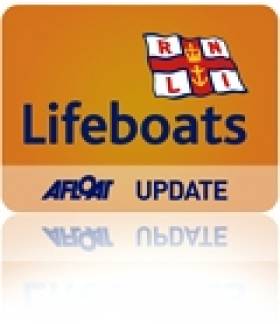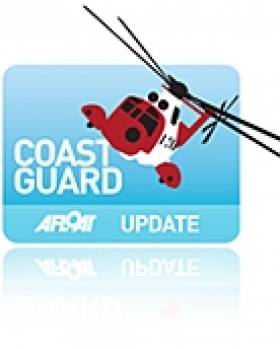Displaying items by tag: Cliffs
Achill Island Lifeboat Attends Injured Woman Off Mayo Cliffs
#RNLI - Achill Island RNLI was tasked to assist a young woman in distress off the cliffs of Old Head in Louisburgh, Co Mayo yesterday afternoon (28 August).
The volunteer lifeboat crew sped to the scene around 4pm yesterday after the woman, who had been diving from a cliff into the sea, was injured on entering the water and required urgent assistance.
As the lifeboat was en route, some of the woman’s friends managed to pull her from the water onto nearby rocks, below the cliff, to await help.
The lifeboat arrived shortly after and sent two crewmen ashore to administer first aid. Westport Coast Guard Unit and Rescue 115, the helicopter from Shannon, were also tasked to the scene.
The woman was taken on board the lifeboat and transferred to the helicopter, which took her to Castlebar General Hospital where her injuries were treated.
Lifeboat operations manager Tom Honeyman said: “This had been a very busy but fulfilling year for the volunteer lifeboat crew with this, the 20th shout so far in 2013.
"It is also another good example of the different wings of the emergency services working in tandem to affect a successful outcome.”
Dramatic Donegal Rescue Marks Busy Start to 2012 for Coastguard
#Coastguard - The Irish Coast Guard has had a busy first few days of the New Year with a number of incidents around the country, including a dramatic search and rescue incident in Donegal.
Carlow man Cormac Nolan was rescued after falling 200 feet and becoming trapped in a crevasse while walking on the Slieve League cliffs on the north west coast of Donegal on Tuesday 1 January.
The cliffs are among the highest sea cliffs in Europe, and combined with the man's precarious position and the weather conditions at the time, the Sligo-based Irish Coast Guard helicopter was unable to winch the man to safety despite its swift response.
The operation - assisted by the Killybegs coastguard unit, Donegal Mountain Rescue and the Aranmore RNLI lifeboat – proceeded to a cliff descent which itself was hampered due to shingle on the cliffside.
Search teams eventually reached the casualty after 10:30pm and began the slow process of bringing him back up the cliff, finally doing so around midnight.
The 28-year-old - who discussed his ordeal on RTÉ Radio's News at One this afternoon - was transported by coastguard helicopter to Sligo General Hospital but no serious injuries were reported.
The Donegal incident was just one of a number of search and rescue taskings received by the Irish Coast Guard over the New Year period, coming after news that the coastguard saved 161 lives last year.
Other incidents included searches for missing persons in Wicklow and Dublin and dispatches to reports of persons in the water in Waterford, Limerick and Louth.
Speaking yesterday, Irish Coast Guard director Chris Reynolds said: “Last year was the busiest ever for the Irish Coast Guard and already in the early days of 2013 we have provided assistance in a number of incidents.
"I am appealing again to the public that they heed local advice and be aware of weather conditions if walking or hiking along our coastline, particularly during winter time.”
Reynolds continued: “There is safety in numbers, so never be alone while walking along cliff paths if possible. Let somebody know when and where you are going and what time you will be back. Stay well away from the cliff edge, both top and bottom. Don’t attempt to rescue people or pets if they fall over the edge.
"If assistance is required dial 112 and ask for the coastguard. Advice as always from the coastguard is if you do see someone in difficulty in the sea, on the shore, cliffs, lakes or rivers, dial 999 or 112 and ask for the coastguard.”































































